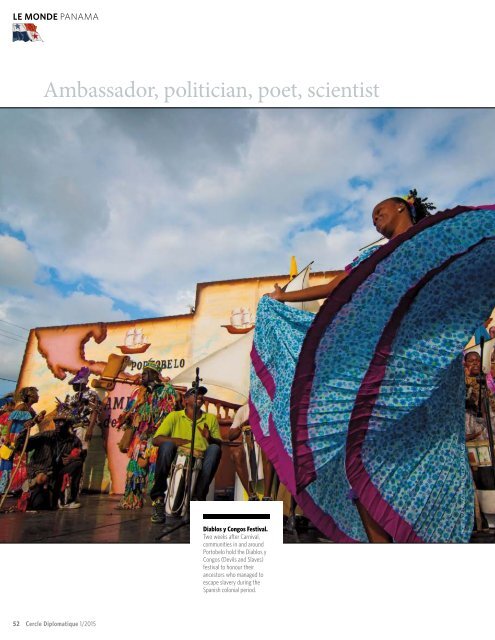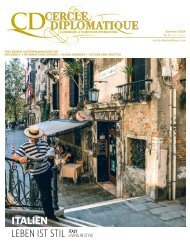IRAK DIE WIEGE DER ZIVILISATION
Create successful ePaper yourself
Turn your PDF publications into a flip-book with our unique Google optimized e-Paper software.
LE MONDE PANAMA<br />
Ambassador, politician, poet, scientist<br />
Text: Petra Stix<br />
Gloria Young, Ambassador of the Republic of Panama in Vienna, has a very<br />
versatile and engaging personality. She writes books and poems, is committed to<br />
research projects and is a respected politician in her country. For a period of over<br />
ten years, she was politically active for her country and therefore has the best<br />
possible credentials to represent the interests of Panama in Austria.<br />
Diablos y Congos Festival.<br />
Two weeks after Carnival,<br />
communities in and around<br />
Portobelo hold the Diablos y<br />
Congos (Devils and Slaves)<br />
festival to honour their<br />
ancestors who managed to<br />
escape slavery during the<br />
Spanish colonial period.<br />
PHOTOS: JOSÉ CARLOS LEIS, JULIA WEICHSELBAUM/HBF<br />
February 3rd 2015, Embassy of Panama, Goldschmiedegasse<br />
10, 1st district in the Vienna<br />
city centre: interview with I.E. Gloria Young,<br />
Ambassador of Panama in Vienna since December<br />
8th 2014. One can hardly imagine a warmer welcome.<br />
We are greeted by a highly charismatic, lively<br />
and alert lady and feel very comfortable in her presence.<br />
She doesn’t hold back and recounts the story<br />
of her eventful life since arriving in Austria in early<br />
December. Still at war with speaking German, she<br />
admits that the complexity of the language is a tough<br />
hurdle to overcome. In an effort to give her best, she<br />
is attending a German course to improve her language<br />
skills. In Austria, she rushes from meeting to meeting.<br />
„Due to the presence of the UN in Vienna there<br />
are plenty of issues on a bilateral as well as multilateral<br />
level“, explains Ambassador Young. Since she<br />
took office in Vienna, she is proud to have acted as<br />
chairman for the Group of Latin American and Caribbean<br />
States (GRULAC) within the United Nations<br />
as well. “I grow with the challenge. It is very exciting<br />
to learn so much about the other Latin American<br />
countries,” said Young.<br />
As Versatile as a Book<br />
The charismatic lady teaches to this day at the Latin<br />
University of Panama City in the Faculty of Law<br />
and Political Science. Furthermore, she is the executive<br />
director of the Department of Gender Studies.<br />
She lectures on various topics such as politics, gender<br />
politics, literature, education and human rights<br />
both at national and international level. She is president<br />
of the Association of Former Parliamentarians<br />
of the Republic of Panama and member of the Central<br />
American Network of „No Violence against Women“<br />
in San Jose, Costa Rica.<br />
From 2010 to 2012, she was president of the National<br />
Council of Writers of Panama. She has released<br />
nine books in total, and over 300 of her articles and<br />
essays have been printed in national and international<br />
publications. Her latest literary work “Nada que<br />
ocultar” (“Nothing to Hide”) is a collection of prose<br />
poems with impressive illustrations by the Panamanian<br />
artists Pearl Bajdez, Silvia Costa and Soledad<br />
Velasco Hernandez. According to Gloria Young’s description,<br />
“It is a book for all the senses, a book to<br />
feel, a book to see, a book to read, to listen to and to<br />
smell”. The famous Panamanian writer Pedro Crenes<br />
Castro referred to Gloria Young in his book review as<br />
“one of the great female literary voices of the country”.<br />
“Nothing to Hide” touches the soul and makes it<br />
shiver at the same time. Gloria Young just recently<br />
presented her book in MUSA (Museum Startgalerie<br />
Artothek) to the Viennese public for the first time.<br />
The Indigenous People of Panama<br />
Ambassador Young tells us about a research project,<br />
she was involved in, with great enthusiasm.:<br />
“The leadership of the Nagbe Buglé woman: Silvia<br />
Carrera”. That is how we also got an insight into the<br />
way of life of the indigenous peoples in Panama. We<br />
learned that in 2011, Silvia Carrera Concepción was<br />
the first woman to be voted cacica (native chief) of<br />
the Ngäbe-Buglé tribe. In 2012, she even made international<br />
headlines by arranging large-scale roadblocks<br />
with her people to prevent the construction of<br />
a hydroelectric power plant on her people‘s land,<br />
which brought traffic to Panama City to a standstill.<br />
Ever since then, mining projects in the autonomous<br />
territories of the indigenous peoples have only been<br />
allowed to go ahead upon their consent. An enormous<br />
victory for a woman from a small Indian tribe<br />
in the mountains of Veraguas.<br />
The Ngäbe-Buglé represent the most numerous<br />
of the indigenous peoples in Panama. About 180.000<br />
Ngäbes and 10.000 Buglé live in the protected “Ngäbe-Buglé<br />
Comarca”, comparable to a reservation.<br />
They have their own political system. The majority<br />
of the Ngäbe-Buglé live in small towns or villages,<br />
particularly in the mountain region of Bocas del<br />
Ambassador<br />
Gloria Young at her<br />
accreditation.<br />
52 Cercle Diplomatique 1/2015<br />
Cercle Diplomatique 1/2015<br />
53

















